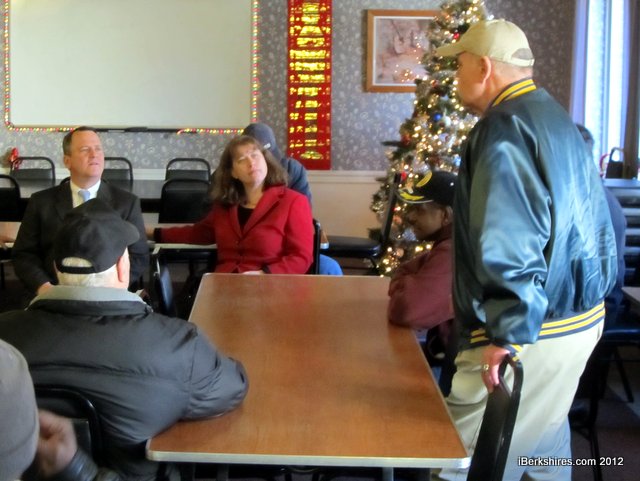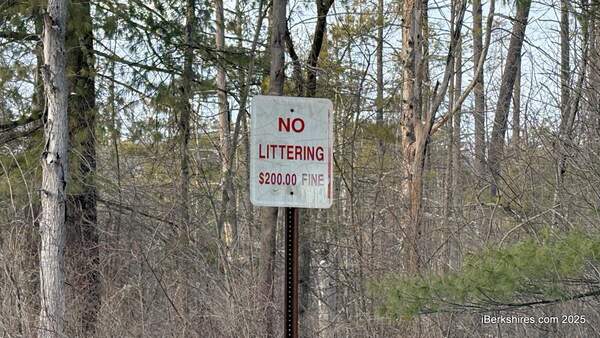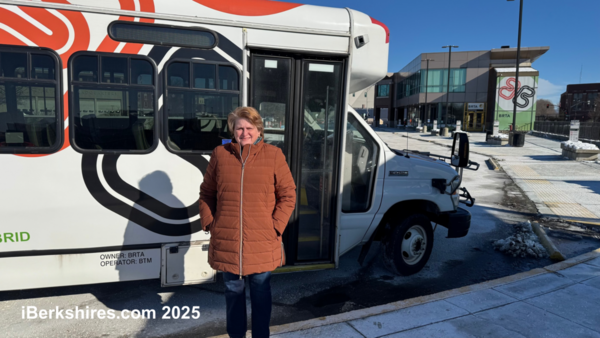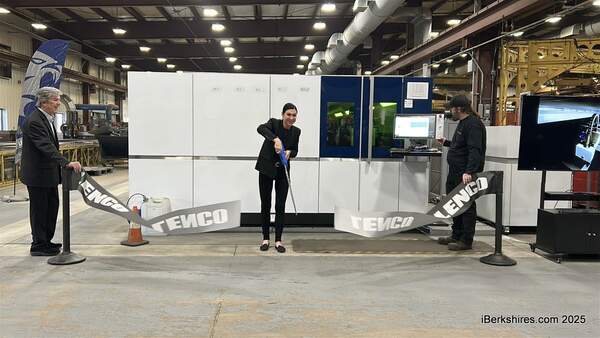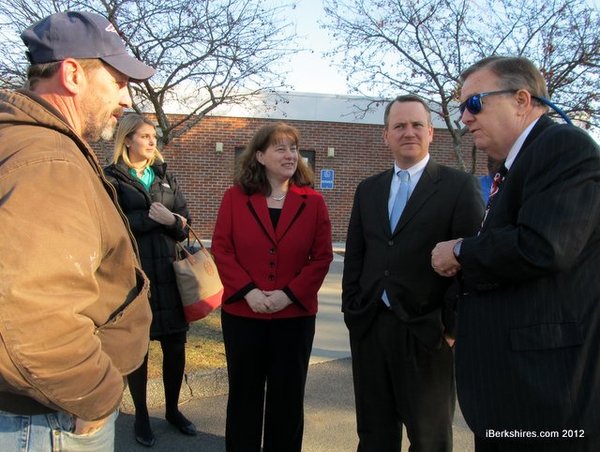
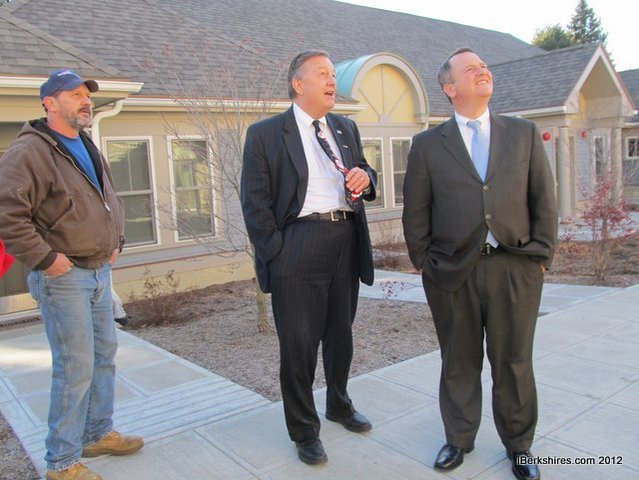
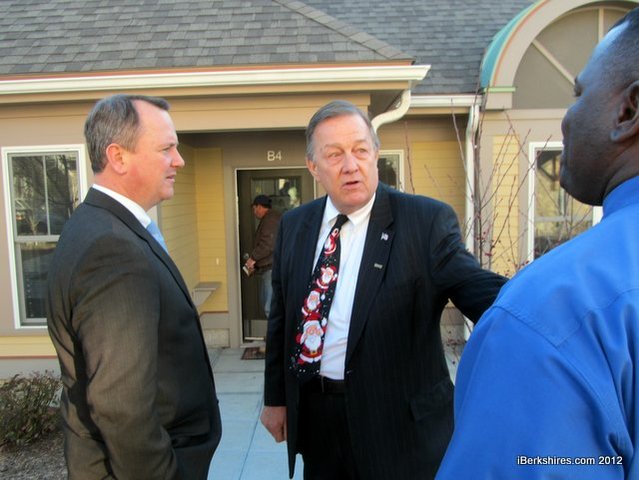
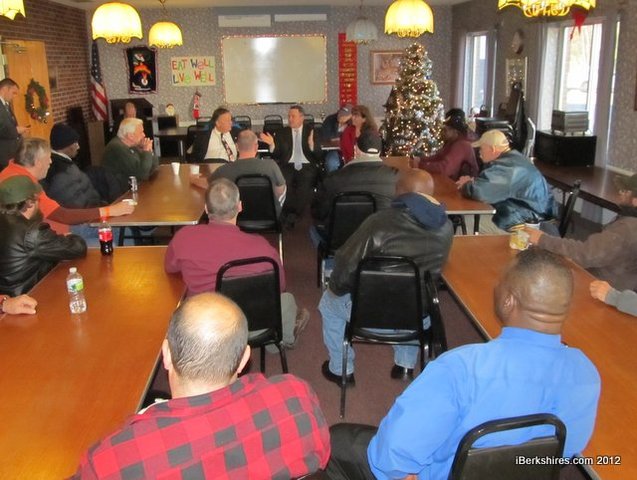
Murray Visits Soldier On To Find New Ways To Help
|
Soldier On staff member Robert Reilly said he 'wants to see [the program] flourish and any help we can get from the Senate and Congress would be huge.' |
PITTSFIELD, Mass. — Only 17 percent of veterans at Soldier On have driver licenses; most of have lost their driving privileges because of struggles with alcohol or drug dependence.
But now that they are sober, it is often too complicated to get their licenses back.
Making that process easier would not only help the veterans get back on their feet but would also help even more people, veterans at Soldier On told Lt. Gov. Timothy Murray on Thursday.
According to John "Jack" Downing, chief executive officer of Soldier On, of the organization's $10 million budget, $800,000 is spent annually on transportation — gas, repairs and tires — for its 39 vehicles.
Those costs set a minimum level of density a housing complex needs in order to be financially viable. For example, Downing said there have been talks with North Adams officials about opening a new location there, but it wouldn't have the density needed to make transportation costs worth it.
Getting veterans their licenses back would ease transportation expenses.
"If they could give us a waiver for veterans who have gone through the programs, it would be a huge weight off our shoulders," Downing said after showing Murray around the Gordon H. Mansfield Veterans Community and explaining the program. "The more our people can do themselves, the lower the costs."
Murray visited the site during a swing through the city to listen to the concerns of the program's participants. He also visited Pittsfield High School in the morning to look at its STEM (science, technology, engineering and math program) and took a tour of General Dynamics, which was closed to the press.
Veteran Tom Clark recapped the struggles many have had trying to earn their driver's licenses back. Downing said the formerly homeless veterans don't have the money to jump through all the hoops required.
"It is so tedious, so difficult that people give up," Downing said.
Clark said he's spoken with congressmen, the state delegation, the governor and now Murray, but no one has been able to help.
Clark was diagnosed with obsessive compulsive personality disorder after his service and eventually landed in jail after nearly running someone over. Clark has multiple college degrees, and after going through counseling for his disorder, he feels ready re-enter the work force.
In the Berkshires, transportation is a much more important for employment than anywhere else in the state, said state Rep. Tricia Farley-Bouvier, D-Pittsfield, because the public transit system is "woefully inadequate."
"You can't rely on our public transportation," Farley-Bouvier said.
Senior staff member Robert Reilly said the residents are talented but can't turn their skills into employment because of the lack of transportation.
Murray said he will contact Secretary of Veterans Services Coleman Nee and Registrar of Motor Vehicles Rachel Kaprielian to see if there are ways to smooth that transition.
"The practical solution is having our Department of Veterans Services work more strategically with the Registry of Motor Vehicles to help veterans. That's something that doesn't cost any money, it is just getting people to work together and smarter," Murray said.
Finding ways to "work smarter" was one of the goals Murray had in multiple stops in Pittsfield on Thursday. The state's revenue has come up short and cuts to the budget are looming. However, Murray reiterated his support for veterans housing, which mixed two of his roles as chairman of both the Interagency Council on Housing and Homelessness and the Advisory Council for Veterans Services.
"We've had much more difficult budgets than this year and I think the standards in which we make decisions are the same. We protect safety net programs, programs that serve our most vulnerable populations and programs that serve out veterans," Murray said.
With hundreds of soldiers returning from Iraq and Afghanistan, Downing said the need for programs such as Soldier On is growing. He is confident that state and federal government officials recognize the need and will continue to support programming.
"They both know transitional housing doesn't work," Downing said of Murray and Farley-Bouvier.
In closing a roundtable with veterans, Murray said the state has "the best programs in the country" and promised that the administration will continue to be "aggressive" in keeping that prestige.
"Soldier On is one of the best in helping veterans and their families in a real positive way," Murray said.
Tags: Soldier On, state officials, veterans,

